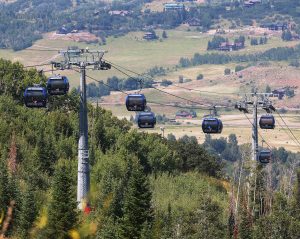City Council kills lift tax for November ballot

John F. Russell/Steamboat Pilot & Today
Steamboat Springs City Council voted 5-2 Tuesday night against placing a lift tax question on the November ballot, while simultaneously approving a ballot question proposing formation of a Yampa Valley Regional Transportation Authority.
The decision ends weeks of heightened discord around transportation funding in the Yampa Valley.
Tensions escalated in late summer after Steamboat Ski & Resort Corp. abruptly scaled back a long-touted $1 million per year, 20-year funding pledge to the RTA to a commitment of $1 million for just one year. After pushback from Routt County commissioners, Ski Corp. ultimately committed to $1 million a year for three years.
The retreat from the 20-year pledge came just weeks before the deadline to finalize ballot language for the RTA formation and triggered renewed calls among some city councilors and community members to place a lift tax question on the November ballot as an alternative funding source for the RTA.
City Attorney Dan Foote opened the discussion Tuesday by summarizing current circumstances.
“There’s a choice to be made here. If the (lift) tax is referred to the voters and imposed, it would replace those agreements,” explained Foote, who referred to both the three-year, $1 million RTA pledge, and also the $2.75 million annual contribution from Ski Corp. for Steamboat Springs Transit executed in early August. “Both of those agreements have provisions that would allow (Ski Corp.) to terminate them in the event the city were to pass a lift tax.”
Foote said the staff recommendation to not proceed with the lift tax ballot language was based on council’s general policy of working collaboratively with community partners, but he acknowledged the politics at play.
“Questions have been raised as to whether or not we actually have a partner at (Ski Corp.), and I think those are valid questions,” said Foote, who noted the difference between Ski Corp. and its parent company, Alterra Mountain Co. “I will say that in my personal experience, I do not see much evidence that people at Alterra consider there to be a partnership with the city.”
Community stakeholders speak out during public comment
Dave Hunter, Ski Corp. president and chief operating officer, addressed the past month of contentious back-and-forths.
“I want to acknowledge and take full responsibility for the confusion and the strain that recent conversations and negotiations have created,” said Hunter, who reaffirmed Ski Corp.’s “ongoing commitment” to both local and regional transit.
Hunter outlined the ski resort’s community contributions beyond transit funding, including in-kind donations to charitable organizations and staff volunteer time.
“Over the last decade, our in-kind giving has allowed over 1,000 children to access the mountain through SOS Outreach, provided access to more than 15,000 STARS clients, and allowed nonprofits to host fundraising efforts to generate critical operational funds,” he said.
“It’s easy to target our resort, but it’s important to remember that we’re a major part of this community and we are stronger together,” he said.
David Box, who spoke as a private citizen and is also a planning commissioner and candidate for the District 3 seat on City Council, urged officials to table the lift tax, at least for now.
“Let’s accept the negotiated money from (Ski Corp.), hold the option for future action … this is where we do have a stick to tie to good faith,” he said. “We can take action in the future if we need to.”
Izzy Rillos, a born-and-raised Steamboat resident and the Ski Corp. product marketing coordinator, shared a personal perspective on the community divide.
“For much of my childhood, the city of Steamboat Springs and (Ski Corp.) felt like one and the same … but as you get older, you start to hear doubts,” she said. “My deepest hope is that children growing up here now will never have to question whether their town and their resort stand together.”
Catherine Carson, who spoke as a private citizen and is also the local Democrat Party chair and a Yampa Valley Housing Authority board member, referred to putting the lift tax on the ballot as a “win-win opportunity,” urging council to allow the community to have a say via the ballot, with little to lose.
“It’s a win opportunity for Ski Corp. to show that we can have a positive election … and it’s a win-win for Steamboat,” said Carson. “If we go to the ballot as a community and win, for the first time since 2019, we can actually get back to the transit funding that we were hoping to attain and serve our community. If we lose, we lose nothing — we are still at $2.75 million (for SST) and $1 million for the RTA.”
“We can do it the Steamboat way — stand up and have a community discussion,” she added.
Community member Diane Brower captured the sentiment of those demanding greater accountability.
“It’s impressive the number of people that the Ski Corp. has gathered together to talk against putting a lift ticket tax to a vote tonight,” she said. “Ski Corp. has not been a fiscally responsible corporate actor when you consider all the impacts it has on housing, traffic, climate, cost of living, mental health.”
“A lift ticket tax is a step towards balancing that equation and potentially helping to fund transit,” she added, “which, again, Ski Corp. largely benefits from.”
Council discussion: trust, partnership and risk of community division
Councilor Michael Buccino remained firm in his opposition to putting a lift tax on the November ballot, stressing the need to avoid a “divisive election.”
Councilor Joella West took a more pragmatic stance, calling the lift tax ballot language “terrific” but noting the risk that passing the tax could do “more harm than good.”
“This is not the year for (the lift tax) … sometimes the wisest thing to do doesn’t feel good, and that’s where I am with this,” said West.
Councilor Dakotah McGinlay reminded fellow councilors that “maintaining service levels where they are today isn’t good enough for our community.”
“I know I said I can live with this, but I think we need to think about the bigger picture and what our goal was,” she said. “I think we should let the community have a say in this.”
Council President Gail Garey and Councilor Amy Dickson expressed deep ambivalence.
“This became connected with the phone call that went from Ski Corp. to our elected officials backing away on the $1 million for 20 years,” Garey reminded fellow councilors, while also underscoring the need to avoid letting the RTA become “collateral damage.”
“There are a lot of people in this community that are really mad … it’s a misstep, and it’s a blemish on Ski Corp,” Garey added.
“The narrative that somehow we are compromising the partnership does not sit right with me,” Dickson said. “Good partners would be Ski Corp. sharing their (skier-day) numbers with our finance director … so she can plan appropriately for the budget. I know you won’t do that, because we’ve asked for it.”
“The eye rolls that I get from people when we talk about Ski Corp. … it’s more like, ‘This is what we expect,’ and I don’t want that,” she added.
Councilor Bryan Swintek stressed council’s responsibility to stand up for its constituents.
“(Ski Corp.) speaks about their contribution like it’s business, yet they say the (Ski Corp.) people are our friends and neighbors. So which is it?” he asked. “You talk about real values … real values would be negotiating in good faith … verbally committing to $1 million for 20 years and actually following through on it when you needed to … yet, you did not do that.”
“There is talk of partnership, but the action doesn’t follow,” he added.
In a 5-2 vote, with Swintek and McGinlay dissenting, council voted against placing a lift tax question on the ballot — leaving unresolved questions and lingering doubts as to who really controls the future of transit in Steamboat Springs and the Yampa Valley.

Support Local Journalism

Support Local Journalism
Readers around Steamboat and Routt County make the Steamboat Pilot & Today’s work possible. Your financial contribution supports our efforts to deliver quality, locally relevant journalism.
Now more than ever, your support is critical to help us keep our community informed about the evolving coronavirus pandemic and the impact it is having locally. Every contribution, however large or small, will make a difference.
Each donation will be used exclusively for the development and creation of increased news coverage.









